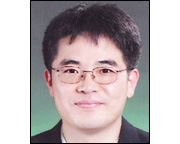A school for fathers
A few years ago, I enrolled at a school for fathers run by a nonprofit corporation, which issued an honorary certificate after completing the designated courses.
I went there because I couldn’t deal with the unexpected friction as my son reached adolescence. In fact, I constantly told my son the same message that every Korean father is forced to work like a slave to provide sustenance in these economically hard times.
One day, soon after I rattled out the verbose advice, it dawned upon me that it would require more time and energy to become a “qualified” father.
Naturally enough, my son didn’t understand the situation I was in. All I did was to make efforts to persuade my son into appreciating all the endeavors I did for him as I did for my students at school.
But playing the role of teacher was one thing, practicing it at home was quite another. Frankly speaking, like any other ordinary father, I did not know how to become a good dad. And I came to realize being a biological parent does not automatically lead to being right. The four-week course was a big challenge. Yet I couldn’t give up in the face of such an obstacle.
At first, I was surprised see as many as 85 fathers pack the classroom. I mulled over why they were there. Soon after the participants were divided into separate groups, they introduced themselves in an ice-breaking session.
I was forced to suppress tears forming in my eyes when members of my group revealed their stories on why they were there, and how they had lived thus far. A middle-aged man said he was once addicted to gambling on horse races and drinking. As a result, his business went bankrupt. He wanted to be forgiven by his family.
Another man confessed his mistakes concerning his family. While he was bent on expanding his business, he did not know his wife was suffering from stomach cancer. A young man preparing for marriage wanted to know how to become a good father through the course. A bald-headed man facing divorce wished that his wife could forgive his infidelity.
Like a large number of Korean fathers in their 50s, I have a few memorable experiences of playing with my own father. He was forced to spend more than 14 hours a day working for his family. Due to grueling work without rest, he supplemented the lack of sleep over the weekend. Deplorable as it was, his home was nothing but an inn at which to sleep.
Thus, our family had to spend miserable weekends. It seemed that even going on a picnic meant great effort as my father was always exhausted.
Looking back, the lingering memory of my father was that he slept like a log at home or staggered back home in exhaustion. I didn’t understand my father’s life at that time as my son doesn’t understand me today. One might attribute the lack of understanding to mental immaturity but the main reason was the lack of a sense of togetherness.
Fortunately for me, by comparing my experiences with other fathers’ stories, I could see what a poor parent I was. I hadn’t recognized until then what great influence a father has on his son.
When I was about to wash my son’s feet as part of the school’s program, he tried to pull them out of my hands, full of bashfulness and unfamiliarity. Most others, fathers and sons alike, couldn’t resist shedding tears because of the sense of gratitude and guilt.
While looking at each other’s faces by candle light, participating fathers seemed to show their family a solemn oath with serious expressions and then by reading a letter, in which they would be reborn as a father full of fidelity, friendliness and responsibility.
I pondered on why so many Korean fathers have been degraded and depreciated like unwanted visitors in their own home. Like me, most of them were accustomed only to striving to sustain and survive, while making themselves extremely lonely and irrelevant in its course, dreaming of winning someday.
I completed all the courses of the father school as the 27th graduate. I received congratulatory words and a bunch of flowers from my son and hugged him. Why didn’t I hug him like that before rather than encourage him to stand tall by patting him on the shoulder? Long after finishing the course, I still don’t know why Korean fathers are growing estranged from their family.
Where is the oasis for tired Korean father to be healed and relax?
The writer is a teacher at Somyoung Girls High School in Bucheon City, Gyeonggi Province. His email address is dicaprik@hanmail.net. <The Korea Times/Oh Jung-hun>



























































